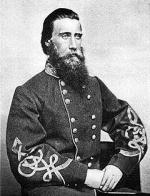Disable ads!
John B. Hood
John Bell Hood (June 1 or June 29, 1831 – August 30, 1879) was a Confederate general during the American Civil War. Hood had a reputation for bravery and aggressiveness that sometimes bordered on recklessness. Arguably one of the best brigade and division commanders in the Confederate States Army, Hood became increasingly ineffective as he was promoted to lead larger, independent commands late in the war, and his career was marred by his decisive defeats leading an army in the Atlanta Campaign and the Franklin-Nashville Campaign. Hood's education at the United States Military Academy led to a career as a junior officer in both the infantry and cavalry of the antebellum U.S. Army in California and Texas. At the start of the Civil War, he offered his services to his adopted state of Texas. He achieved his reputation for aggressive leadership as a brigade commander in the army of Robert E. Lee during the Seven Days Battles in 1862, after which he was promoted to division command. He led a division under James Longstreet in the campaigns of 1862–63. At the Battle of Gettysburg, he was severely wounded, rendering his left arm useless for the rest of his life. Transferred with many of Longstreet's troops to the Western Theater, Hood led a massive assault into a gap in the Union line at the Battle of Chickamauga, but was wounded again, requiring the amputation of his right leg. Hood returned to field service during the Atlanta Campaign of 1864, and at the age of 33 was promoted to temporary full general and command of the Army of Tennessee at the outskirts of Atlanta. There, he dissipated his army in a series of bold, but fruitless assaults, and was compelled to evacuate the besieged city. Leading his men through Alabama and into Tennessee, he severely damaged his army by ordering a massive frontal assault at the Battle of Franklin and was decisively defeated at the Battle of Nashville by his former West Point instructor, Maj. Gen. George H. Thomas, after which he was relieved of command. After the war, Hood moved to Louisiana and worked as a cotton broker and in the insurance business. His business was ruined by a yellow fever epidemic in New Orleans during the winter of 1878–79 and he succumbed to the disease himself, dying just days after his wife and oldest child, leaving ten destitute orphans.
 Read more on wikipedia.org Read more on wikipedia.org
 All quotes by John B. Hood All quotes by John B. Hood
 Edit Edit
|

|
|
|
|
|
Background photo by Giuliana
|